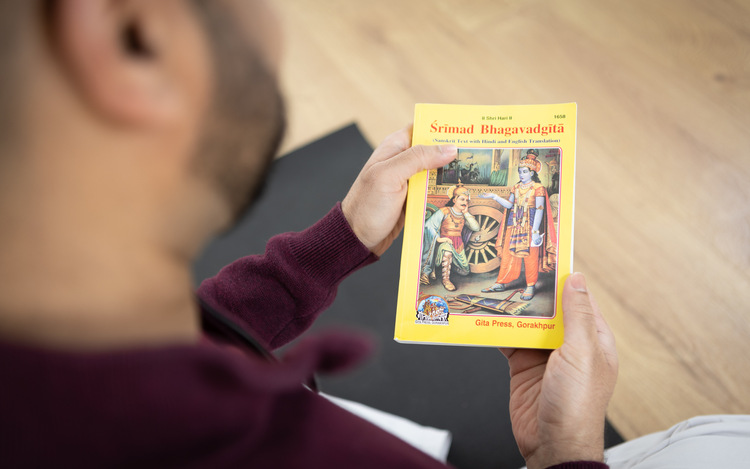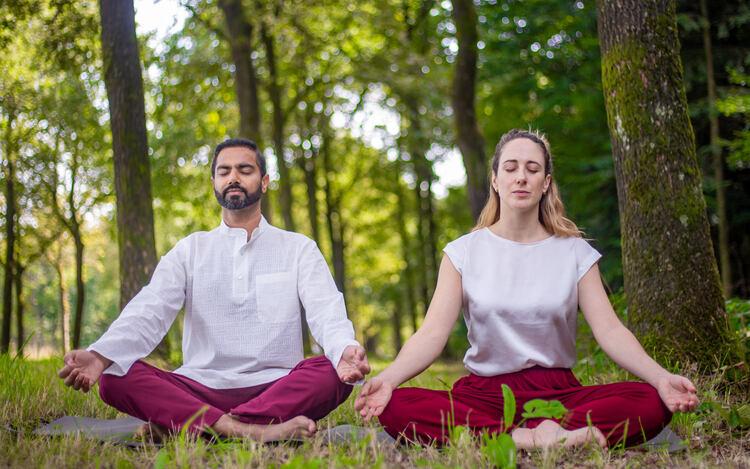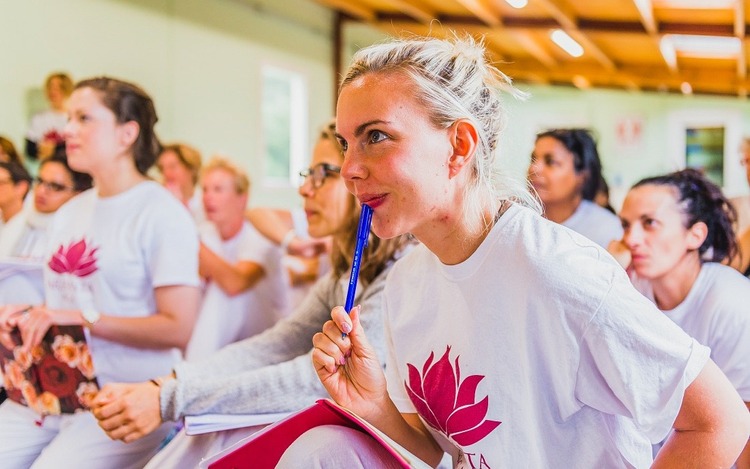What Is Jnana Yoga? Meaning, Benefits & How to Practice the Yoga of Knowledge
Yoga is a path to many things, whether you’re striving for peace, the perfect posture, or a more balanced life. But, one of the most important (and challenging) paths found in yoga is Jnana Yoga. Known as the Path of Knowledge or Gyana Yoga, this powerful practice is about courageously examining our inner world—flaws, worries, emotional triggers and all—so we can live with eyes wide open. Unlike passing highs from scrolling on Instagram or shopping at the mall, Jnana Yoga offers us the kind of radical self-awareness and peace we are all seeking deep down.
While practicing and even pronouncing Jnana Yoga can be challenging, you don’t have to be a revered guru or experienced yoga instructor to understand it. In this comprehensive guide, I’ll explain the meaning of Jnana, its benefits, how to pronounce it correctly, as well as simple ways you can walk the Path of Knowledge in your daily life.
What Is Jnana Yoga?

Unlike Vinyasa or Hatha Yoga, Jnana Yoga isn’t a physical asana practice. It’s one of the Four Paths of Yoga which were designed to lead spiritual seekers to enlightenment or true self-awareness.
The four paths presented in yoga philosophy are:
Karma Yoga (the Path of Duty)
Bhakti Yoga (the Path of Devotion to Purity)
Raja Yoga (the Path of Self-control)
Jnana Yoga (the Path of Knowledge of Self)
Also known as Gyana Yoga, Jnana Yoga is defined as the practice of shedding the ego and gaining knowledge of the true Self through self study and analysis. With this deep awareness of the ‘Self’, you are able to understand the difference between what is real and unreal.
What Does Jnana Yoga Mean?
“Jnana” means knowledge or awareness, and “Yoga” refers to the unity of the Self with reality. Together, these words refer to awareness and understanding of the Self.
It’s important to emphasize that the knowledge referred to in this definition of Jnana Yoga is knowledge of and about the Self. Jnana Yoga is not about the pursuit of any kind of information. It relates only to gaining knowledge and awareness about the ‘Self’. On a surface level, this could be understanding your physical, mental, and emotional limitations. On a deeper level, self-knowledge is the awareness that the individual Self is inseparable from the higher Self, or greater whole.
How to Pronounce Jnana Yoga
The pronunciation of Jnana can be a tongue-twister for even the most experienced practitioners. That’s because it has been passed down across various dialects and written records, resulting in a uniquely challenging name to pronounce. The trick for an English speaker is to almost completely ignore the written letters as Jnana Yoga is not pronounced the way it looks.
Jnana is pronounced as “G’yahn”, in some places you might also see it spelled as “Gyana”. That’s a hard “G”, as in “good”, and an “ah” as in “open up and say ah”. When pronounced traditionally, Jnana Yoga becomes “Gyan Yōg”, with the final “a” silent in both words.
Principles of Jnana Yoga

Jnana Yoga is the path of self-inquiry—a logical exploration inward to understand your essence beyond surface thoughts, feelings, and ego. Practicing self-reflection with radical honesty, you acknowledge weaknesses and areas needing growth.
Through this practice, you also tap into pure inner wisdom and purpose at your core; what some call the higher Self. However, before you can embark on this life-changing journey, you first need to understand the meaning of knowledge and ego as it relates to the Self.
How to Practice Jnana Yoga

Practicing Jnana Yoga involves receiving knowledge, analyzing it, understanding it, and detaching the ego from the Self in the process. This makes a person stronger and guides them closer to purity. By being curious about the world and patient in our approach, we effectively practice Jnana Yoga and progress in the journey toward true awareness of Self.
Jnana Yoga offers three powerful yet simple practices to attain self-awareness: hearing the wisdom, reflecting on the teachings, and meditating on the Self.
Hearing the Wisdom
The first step towards self-awareness is to open your heart and mind to the wisdom of yoga and Vedic philosophy. Set aside time each day to read yogic texts like the Upanishads and Bhagavad Gita. Try to understand the deeper meaning behind the words by attending lectures or enrolling in yoga philosophy courses where you can discuss your insights with a teacher or fellow student. Take notes and cultivate an open and receptive attitude rather than just an intellectual approach.
Reflecting on the Teachings
After hearing the wisdom, you need to reflect on the lessons and insights you’ve found. Think deeply about the spiritual principles and how they challenge or align with your own beliefs and preconceptions. How would applying this wisdom transform your perspective in daily life? For example, reflecting on interconnectedness can lead you to act with more compassion and empathy. Allow the teachings to illuminate every aspect of your life and be willing to adjust attitudes and behaviors to follow this wisdom.
Separating Truth from Illusion
After observing and reflecting on this knowledge, the next step is to determine what is the truth and what is not. The ancient Indian teachings of the Upanishads explain that anything that comes and goes, changes, or has flaws does not reflect the deepest truth of things. This includes our normal everyday view of the world and universe.
Even though our view of the material world has practical everyday truths and use, the Upanishads suggest it does not capture the Whole Truth. Beneath the partial, shifting projections of our minds shines Brahman, the one unchanging and flawless Truth that remains when our limited views fall away. This is why the sages encourage us to question appearances and preconceptions we know as the truth. As we look carefully with an open, patient attitude, we start to sense the changeless perfection always there behind the scenes.
Meditating on the Self
The final Jnana Yoga practice involves dedicated meditation or self-inquiry and understanding the difference between the physical, astral, and spiritual body. The best way to approach this, especially if you lead a busy lifestyle, is to establish a formal meditation practice by setting aside time each morning and evening.
Sit comfortably in a meditation position and turn your attention inward. Observe the workings of your mind. Notice how thoughts and emotions come and go. Turn your inquiry to the source of consciousness that perceives them. Ask, “Who am I?” and feel into that spacious awareness. Try to view life from the perspective of Absolute Reality rather than just your ego. Over time, you will naturally perform all actions from this place of inner stillness and oneness.
Remember, self-discovery through Jnana Yoga is a lifelong process; one often filled with uncertainty. There may be times where you feel lost, but it’s important to remain resilient and stay on track. Each stage has meaning and cannot be rushed. When you need guidance, turn to the Seven Stages of Knowledge outlined in the Vedas. These seven steps act like milestones, helping us track the progress made on the winding road toward self-realization.
Benefits of Jnana Yoga

As I mentioned earlier, the purpose of Jnana Yoga is not to gain any personal benefit or achievement. That said, there are many ways this practice indirectly enhances your life and relationships, whether you realize it or not. Here are just a few benefits of Jnana Yoga I have encountered on my own journey.
Inspires More Thoughtful Responses
When we take time to observe our typical reactions and dig into the backstory behind them, something changes. We recognize old thought patterns that used to drag us down without question. And suddenly, we can catch that frustration and make space for better choices beyond ego.
Cultivates Meaning & Purpose
As we gain insights through reflection, our true purpose becomes clearer too. We may uncover a talent for healing others through writing or conversation. Or realize we beam sharing little everyday joys despite past beliefs that we had nothing unique to offer. Our purpose unfolds when we can finally see ourselves fully. This leads to a happier, more fulfilled life.
Promotes Self-Acceptance
You know the expression, “you attract what you are”? Jnana Yoga helps us sit courageously with every aspect of ourselves—anger and jealousy included—so we stop judging similar traits in friends or strangers. When ego loses volume, empathy and compassion naturally amplify. Suddenly it becomes so clear we’re all walking the same path together.
Who Should Practice Jnana Yoga?
Practicing Jnana Yoga requires an openness of spirit rather than intellectual genius. More important than IQ are qualities like patience, analytical skill, and a desire to find the truth. Jnana yogis view the world as Maya; a temporary illusion of forms and names. And in life’s constant evolution, they seek the changeless essence beneath it all.
It’s also important to remember that there isn’t only one path to enlightenment. You may choose to combine this path with Karma or Raja Yoga, or walk just one. It all depends on your personality and circumstances.
Final Thought
The path of Jnana Yoga takes real commitment, but the rewards make each step worthwhile. As we question familiar ideas about who we are, walls built by the mind start crumbling and we are able to reconnect with the true wholeness inside.
Practicing Jnana Yoga as a path to self-knowledge can be a very powerful tool to raise your awareness, reduce your ego, and move you closer to the seventh stage of yoga: Enlightenment.
[……]

